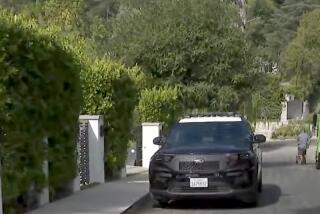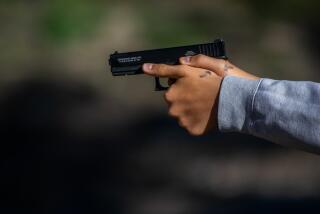The Fight Against Crime: Notes From The Front : Unlocking Secrets of the Smith’s Trade
The press release announced: “Home Locksmithing Class Taught, Amateurs Learn the Secrets of the Trade” at Glendale Community College.
Hmmm. Is this a good idea? Could this be a way for bad guys to add a level to their pestilential skills?
Decisively not, said Mark Wall, the instructor. Especially this time.
“No one showed up,” he said.
Even when students do appear, they run more to apartment owners who want to be their own handymen than the Night Stalker doing post-grad work.
“No, that kind of thing doesn’t happen much, if at all,” said Wall, who has been teaching the three-hour class for two years.
Others agreed. “Never heard of such a thing,” said Gordon Roberts, who runs a locksmithing “shop” out of a weathered green van that he parks at street corners and parking lots from Woodland Hills to Hollywood.
“No, not really,” said Ernie Mendoza, owner of a shop in Van Nuys.
“Well, one time,” said Vannie Prudhomme, who runs a trade school and has a shop in South-Central Los Angeles.
Aha!!!
The dishonest locksmith “went and made a key for someone’s house. But what he did was make a second key,” Prudhomme said.
“Eventually, they caught him. Gave him 30 years because he was a locksmith and had used what he had learned to do break-ins.
“It doesn’t pay to fool around,” he said.
Nevertheless, considering they can get into locked houses, cars and safes, locksmiths are loosely regulated.
For self-employed small timers, there is no training requirement, no examination and no need for a license, said Nancy Handalier, spokeswoman for the state Department of Commerce’s Security and Investigative Services Program, which oversees locksmiths, private investigators, security guards, burglar-alarm installers and such.
But locksmiths who own a business or perform jobs that cost more than $300 must get a contractor’s license, which requires an exam, payment of various fees and a record clear of felonies or any misdemeanors involving dishonesty. That requires passing a fingerprint check with Sacramento authorities and the FBI.
They are required to keep work orders on file for two years, in case law-enforcement agencies want to check.
Though licenses are not necessarily required, Prudhomme, a locksmith for 32 years who got his start in a Canoga Park shop, said getting a license brings greater security.
He runs his training school out of the back room of his shop. To graduate, students must pay $3,085 and endure 312 hours of classes and on-the-job training in such skills as changing combinations, installing locks, pulling steering wheels and fitting keys.
A lot of time and money, Prudhomme admits, but well worth it.
“If you work hard, you can make all kinds of money,” he said.
A hazard of the trade: opening doors for the wrong people.
One time it was a repo man who claimed to have locked his keys in his car. When the driver appeared, the repo man fled, leaving Prudhomme to explain why he was breaking into the vehicle.
Another time, he was opening a door for a woman who said she locked herself out of her apartment. A man’s voice boomed out from inside: “If you don’t leave, I’ll blow a hole through the door.”’
Prudhomme left immediately.
“I’m a locksmith,” he said. “I don’t go for a lot of excitement.”
More to Read
Sign up for Essential California
The most important California stories and recommendations in your inbox every morning.
You may occasionally receive promotional content from the Los Angeles Times.









